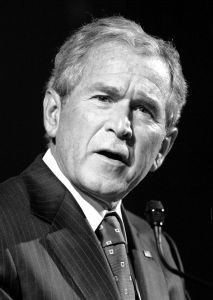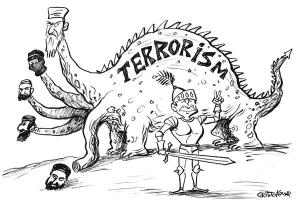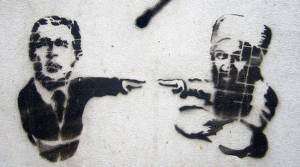 On September 11, 2001, at 8:30pm, President George Bush took the stand and address the nation, as well as the world, about the tragic events of the first terrorist attack that had occurred on American soil. In his first address to the nation, President Bush’s speech was filled with unifying language against “evil”—identification rhetoric which establishing a clear ‘us versus them’ emphasis— with the repetition of “our”: “our country,” “our freedom,” and “our nation.” Creating an unclear enemy by not naming them, since those who had done the terrorist attack were unknown at the time, President Bush somehow convinced the nation that despite this tragedy the “evil” had “failed” and that “our country [was] strong” enough to withstand all things. Applying a commonplace by inserting well-known bible verse, Psalm 23, President Bush ended his somber speech by enforcing the Christian values that are the “foundation of America.” A “good and just” nation, America, according to President Bush, was still in God’s favor and thus would be able to preserver.
On September 11, 2001, at 8:30pm, President George Bush took the stand and address the nation, as well as the world, about the tragic events of the first terrorist attack that had occurred on American soil. In his first address to the nation, President Bush’s speech was filled with unifying language against “evil”—identification rhetoric which establishing a clear ‘us versus them’ emphasis— with the repetition of “our”: “our country,” “our freedom,” and “our nation.” Creating an unclear enemy by not naming them, since those who had done the terrorist attack were unknown at the time, President Bush somehow convinced the nation that despite this tragedy the “evil” had “failed” and that “our country [was] strong” enough to withstand all things. Applying a commonplace by inserting well-known bible verse, Psalm 23, President Bush ended his somber speech by enforcing the Christian values that are the “foundation of America.” A “good and just” nation, America, according to President Bush, was still in God’s favor and thus would be able to preserver.
In the article “‘Our Mission and Our Moment’: George W. Bush and September 11th,” Murphy describes Bush’s rhetoric as “purely epideictic.” Originating from the Greek word epidektikos, which means to exhibit, show off, and display, an epideictic rhetorical  discourse aims to unify the community and amplify its virtues, which compares to deliberative discourse which aims to justify the expediency or practicality of an action. Aiming for Americans to unify in a time of distress and shift towards war, President Bush amplified the country’s virtues and the need to defend them, noted Murphy. Through this approach, President Bush was able to use his discourse, not to persuade the American audience, but rather it allowed him to “dominate public in of the events of September 11” and become, I will argue, the single spokesperson for our Nation.
discourse aims to unify the community and amplify its virtues, which compares to deliberative discourse which aims to justify the expediency or practicality of an action. Aiming for Americans to unify in a time of distress and shift towards war, President Bush amplified the country’s virtues and the need to defend them, noted Murphy. Through this approach, President Bush was able to use his discourse, not to persuade the American audience, but rather it allowed him to “dominate public in of the events of September 11” and become, I will argue, the single spokesperson for our Nation.
This idea of President Bush as the spokesmen for September 11th is visible in the media which was produced by major newspapers following the tragic event and his address. For instance, in the article, “U.S. ATTACKED; President Vows to Exact Punishment for ‘Evil,’” Schmemann re-uses much of the presidents rhetorical discourse to highlight the events of 9/11. Contrasting the elements of chaos that stuck the nation with the harmony of Americans helping their fellow Americans, the article evoked Presidents Bush’s similar charge for unity in the heat of terror and a clear determination to fight the terror in our backyard. This particular author even went as far as to label the “evil,” or enemy, President Bush had yet to mention in his first address. Naming the enemy the “rejoicing  Palestinians,” Schmemann and many other authors created a non-Western face as our enemy. Now all the nation had to do was act.
Palestinians,” Schmemann and many other authors created a non-Western face as our enemy. Now all the nation had to do was act.
With this blog, I will focus my rhetorical analysis on President Bush’s September 20, 2011 address to congress and the nation on the next step he believed were necessary to combat terrorism. With this speech, I will examine how President Bush post 9/11 rhetoric with genre, visual imagery and creation of unity, allowed him the opportunity and authority to appeal to Americans and essentially speak on their behalf’s. In Fusman article, “U.S. Presidential Discourse, September 11-20, 2011: The Birth of the War on Terror,” he explains that with this stance, President Bush was able to “[establish] a synechdocal relationship with the people [which allowed him to represent] our experiences, feelings, and actions and [speak] of those actions in our voice.” Through the three strategies I will focus on that President Bush used, I will look at how his speech lead the nation towards his singular public understanding of the events of September 11th and how this allowed him to gain support towards his “war on terror.”